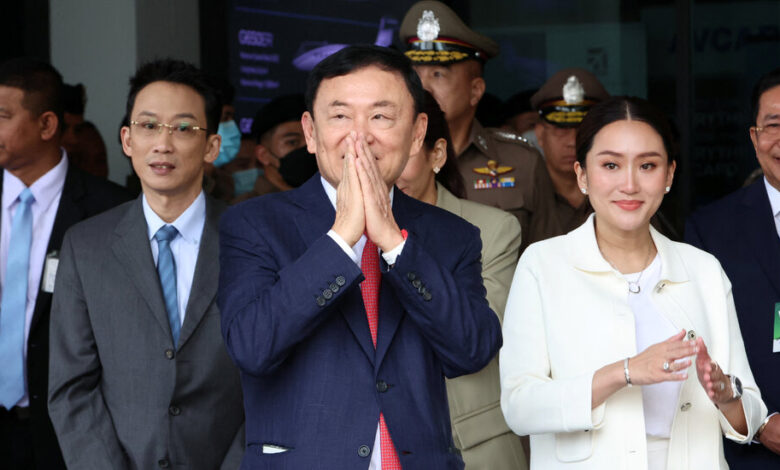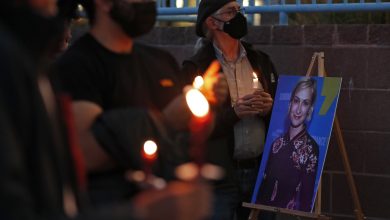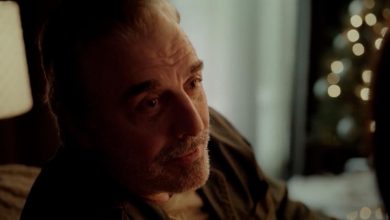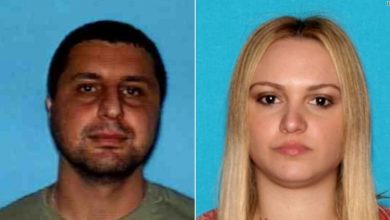Thai Ex-Prime Minister Returns From Exile Amid Growing Political Chaos

Thaksin Shinawatra, the former premier who was ousted in a coup and has been living in exile since 2006, returned to Bangkok for the first time in 15 years on Tuesday and was quickly taken into custody, adding to the country’s political drama on a day that Parliament was set to vote for a new prime minister.
Mr. Thaksin was living in self-imposed exile in part to avoid serving a 10-year prison sentence on corruption and abuse of power charges stemming from his telecom business and premiership. He was tried mostly in absentia and found guilty of several of the charges.
On Tuesday morning, hundreds of Mr. Thaksin’s supporters lined the roads leading to the Don Muang International Airport in Bangkok, dancing and singing as they waited for his plane to land. When he emerged, he bowed in front of portraits of the king and queen as his supporters chanted, “Thaksin, Thaksin!”
Mr. Thaksin was then taken to the Supreme Court, where he learned he would be sentenced to eight years in prison in connection with three corruption and abuse-of-power cases.
A decade ago, it was unthinkable that Mr. Thaksin would return to Thailand. He has long been viewed as a threat to wealthy Thai society, his influence so dangerous that the military launched a coup against him and later his sister, Yingluck Shinawatra. His name recalled bitter divisions between the pro-Thaksin “red shirt” protesters from the rural north and the anti-Thaksin “yellow shirt” faction made up of royalists and the urban elite.
The two groups often battled it out on the streets of Bangkok, clashes that turned violent and deadly.
But as Thailand struggles to elect a new leader, Mr. Thaksin is now seen as the potential face of compromise, a possible ally to represent the interests of the old guard while helping the country out of a political logjam. His homecoming has fueled speculation among the public that he has made a deal with powerful royalists to have his jail term reduced in exchange for keeping the military and conservative establishment in power.
Thailand has not named a new prime minister since holding its general election in May, when Pita Limjaroenrat led his progressive Move Forward Party to victory in the general election. Mr. Pita’s party had vowed to reform the monarchy and the military. After the election, he was functionally blocked from office by allies backing both institutions.
Mr. Thaksin’s return reflects the degree of confidence that he has in Pheu Thai — the populist party he founded in 2007 — to form a government and elect a new prime minister this week. Srettha Thavisin, a real estate tycoon and a close ally of Mr. Thaksin, has been nominated for the job by Pheu Thai, but it remains unclear if he will win the post once voting is done on Tuesday.
At a news conference on Sunday, Paetongtarn Shinawatra, Mr. Thaksin’s youngest daughter, said her father would not be involved in politics once he returned to Thailand. But few Thai voters believe that claim.
Pheu Thai still looks to the charismatic 74-year-old billionaire for guidance, according to party members. His policies also remain popular in Thailand, where many Thais recall his populist agenda fondly, particularly his $1 health care program and the disbursement of loans to farmers when he was prime minister from 2001 to 2006.
“We still love him,” said Chuda Suradee, 70, a supporter from neighboring Chonburi Province who arrived at the airport in Bangkok at 2 a.m. “All of us are very happy. Look at all this — all red!” she said, gesturing to the sea of red shirts in the crowd.
“When we had him as prime minister, everything was good, we could eat and live prosperously,” said Pakop Phuekthai, a 57-year-old supporter. “He did everything for the grassroots.”
But more recently, some Pheu Thai supporters have felt betrayed by the party’s moves to partner with the military in order to form a new government and elect a prime minister.
Earlier this month, Pheu Thai abandoned its main coalition partner, the progressive Move Forward Party, which won the general election in May. Move Forward had refused to withdraw its pledge to revise a law that criminalizes criticism of the powerful Thai monarchy, an institution fiercely backed by conservatives and the military.
Until now, Pheu Thai had vowed never to partner with military-backed parties in Parliament.
Despite his influence, Mr. Thaksin no longer has the same hold over the Thai public that he did a decade ago. A generation of young Thais see him as a self-serving politician obsessed with orchestrating an elaborate homecoming. In his absence, other charismatic figures like Mr. Pita, the leader of the Move Forward Party, have risen, appealing to an electorate disillusioned with the politics of the old.
In 2008, Mr. Thaksin made a brief return to Thailand after his political allies won an election. During that time, he and his then-wife, Potjaman Na Pombejra, were tried on a conflict-of-interest case over a plot of land that was sold to Ms. Potjaman. Mr. Thaksin fled to London before the guilty verdict was handed down.




